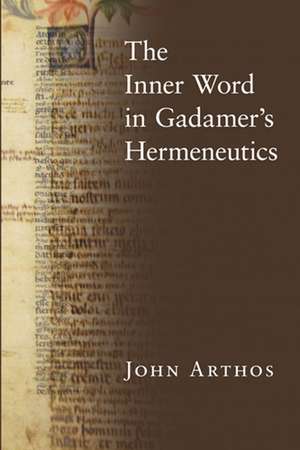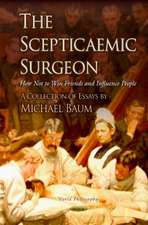The Inner Word in Gadamer′s Hermeneutics
Autor John Arthosen Limba Engleză Hardback – 29 iul 2009
Late in his life, Hans-Georg Gadamer was asked to explain what the universal aspect of hermeneutics consisted in, and he replied, enigmatically, “in the verbum interius.” Gadamer devoted a pivotal section of his magnum opus, Truth and Method, to this Augustinian concept, and subsequently pointed to it as a kind of passkey to his thought. It remains, however, both in its origins and its interpretations, a mysterious concept. From out of its layered history, it remains a provocation to thought, expressing something about the relation of language and understanding that has yet to be fully worked out.
The scholastic idea of a word that is fully formed in the mind but not articulated served Augustine as an analogy for the procession of the Trinity, and served Thomas Aquinas as an analogy for the procession between divine ideas and human thought. Gadamer turned the analogy on its head by using the verbum interius to explain the obscure relation between language and human understanding. His learned interpretation of the idea of the inner word through Neoplatonism, Lutheranism, idealism, and historicism may seem nearly as complex as the medieval source texts he consulted and construed in his exegesis, but the profoundity of his insights are unquestioned.
In unpacking Gadamer's interpretive feat, John Arthos provides an overview of the philosophy of the logos out of which the verbum interius emerged. He summarizes the development of the verbum in ancient and medieval doctrine, traces its path through German thought, and explains its relevance to modern hermeneutic theory. His work unfolds in two parts, as an expansive intellectual history and as a close analysis and commentary on source texts on the inner word, from Augustine to Gadamer. As such, this book serves as an indispensable guide and reference for hermeneutics and the intellectual traditions out of which it arose, as well as an original theoretical statement in its own right.
“Consummately researched, lucidly written, and persuasively argued throughout, The Inner Wordsucceeds brilliantly in bringing to light this neglected but pivotal matter in Gadamer’s work. Arthos is learned in the best ‘humanist’ way, for he succeeds in creating something new of his own that will speak eloquently to all of us.” —Walter Jost, University of Virginia
“Gadamer suggests that the Christian idea of incarnation is a key to his hermeneutics, but does not explain his position in a detailed or systematic manner. Arthos brings his considerable knowledge of hermeneutics and rhetoric to bear on Gadamer's insight, recounting the rich intellectual history to which Gadamer gestures, and providing an extended and detailed exegesis of this pivotal point in the third part of Truth and Method. Gadamer's account of 'linguisticality,' Arthos explains, can best be understood through his use of a complex metaphor—the ‘inner word.’ Arthos matches his erudition with clear and clean prose, and his account exemplifies, rather than just describes, Gadamer's hermeneutical philosophy. Any scholar interested in Gadamer's philosophy should have this book on his or her shelf.” —Francis J. Mootz III, William S. Boyd Professor of Law, William S. Boyd School of Law
“Arthos's strength lies for me in his careful reading of the sources. He effectively commands the literature on the subject. This work shows in a sophisticated way the legacy of trinitarian theology for philosophical hermeneutics. The very complex task of illuminating the phenomenon of the verbum interius and indicating its centrality for philosophical hermeneutics is accomplished by John Arthos with great sensitivity to the subject matter.” —Andrzej Wiercinski, The International Institute for Hermeneutics
Preț: 470.60 lei
Nou
Puncte Express: 706
Preț estimativ în valută:
90.05€ • 93.04$ • 74.91£
90.05€ • 93.04$ • 74.91£
Carte tipărită la comandă
Livrare economică 19 martie-02 aprilie
Preluare comenzi: 021 569.72.76
Specificații
ISBN-13: 9780268020347
ISBN-10: 0268020345
Pagini: 480
Dimensiuni: 160 x 231 x 31 mm
Greutate: 0.79 kg
Ediția:1st Edition
Editura: MR – University of Notre Dame Press
ISBN-10: 0268020345
Pagini: 480
Dimensiuni: 160 x 231 x 31 mm
Greutate: 0.79 kg
Ediția:1st Edition
Editura: MR – University of Notre Dame Press
Recenzii
“. . . Arthos’s book provides a rich resource in delving into both the history of the verbum and its hermeneutic appropriation by Gadamer. This work, then, is not only an essential read for Gadamerian scholars but also a valuable source for those interested in engaging the masters of medieval thought with the hermeneutic turn.” —International Philosophical Quarterly
Arthos’s book is arguably the definitive statement on how to read Gadamer’s Trinitarian claim . . . an indispensable resource to practical rhetorical critics as well as to theorists in understanding what is at issue in our assumptions about language, agency, and meaning.” —Rhetoric and Public Affairs
“John Arthos’s . . . book . . . will be a model for future scholarship on Gadamer’s intellectual inheritance. . . . Drawing widely from Gadamer’s writings while focusing on one crucial move in Gadamer’s argument, it provides both a systemic interpretation of Gadamer’s philosophical hermeneutics and an informative overview of those views—ancient, medieval and modern—that helped shape crucial aspects of Gadamer’s thought.” —Notre Dame Philosophical Reviews
“While offering a close reading of Gadamer’s position on the inner word, the author’s book stands as a valid contribution to the philosophy and theology of ‘Logos,’ one that leads the reader to a more profound understanding of the nature of language and the linguistic self.” —Catholic Library World
Notă biografică
John Arthos is associate professor of communications at Denison University.











